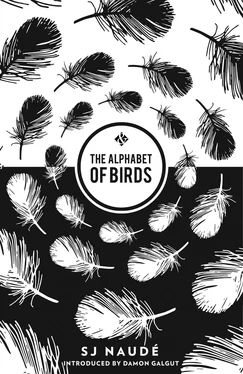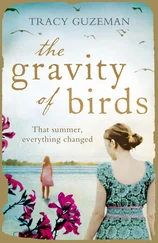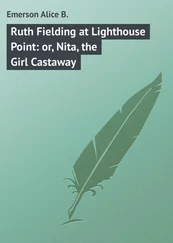Ondien looks around. In the back of the Land Rover she can make out Nungi’s head on Beauty’s shoulder. Beauty’s eyes are shining.
Hendrik looks at Ondien. ‘Almost there.’
She holds her watch right before her eyes. Two o’clock. Where on God’s earth is he taking them? Hendrik’s teeth are white in the dark. She can hear the little dog panting. She can smell its urine. She does not look around again.
VNLS’s first performances were in tiny clubs africains . In these places, with their walls of velvet and names like Zouzou or Boum-Boum in neon above the entrances, it felt like 1971. They had to steer towards the little stages between women from further up north in Africa, women with chocolate skins, stretched limbs, platform shoes and Afros. The air was thick and rich, the bodies as smooth and fluid as oil. These nights of glowing cocktails were not the Africa that Ondien knew. It made her skin tingle. For the first time since her student performances for connoisseurs in auditoriums, she could do something again, rather than just write or think. And it was the real thing. Beauty and Nungi thrived. Their rhythms became slippery, their voices sweeter and stranger.
After a few weeks, Thierry moved their performances to mainstream places, in the sixth or eleventh arrondissements, their audiences now predominantly white. Musique et la danse Zouloues , the posters and handbills announced. Beauty and Nungi’s performances were suddenly muted. The intimacy and the intoxication of the clubs africains were lost. After the first performance, she objected to et la danse .
‘We sing,’ she said.
Thierry shrugged his shoulders, his mouth drooping — his most characteristic gesture, she soon realised.
‘What is it that these two sexy girls do, then?’ He pointed to Beauty and Nungi.
Midnight, on his balcony, after the second performance, she said: ‘But it’s not just musique Zouloue , it’s more complex. You’re putting us in a box.’
‘Tone down the improvisations,’ he said, ‘and the digressions. You are losing the audience. Keep it simple.’
Several performances and similar conversations later, Thierry decided it was time to reconsider the image and the approach. He wanted to start with the name, but Ondien would not budge. VNLS it had to be. He wanted to elevate the comédie , and the sensualité .
‘We’re trying to entertain here,’ he said. ‘How to defuse the seriousness, bring some levity, that’s the question. How to find the lieu du désir in your audience. Think of Josephine Baker. Think of the two girls—’
‘They have names, Beauty and Nungi.’
‘Think of Beauty and Nungi in Josephine Baker banana skirts — before you say anything, think of that iconic image, how powerful allusions to it are. In ironic fashion, of course. We have to think: what is our greatest asset, what lures people to VNLS shows?’
He took a photograph from his pocket, put it down on the table: Beauty and Nungi in full swing, hips and breasts swollen and glistening in the stage light.
‘We’ve never wanted to be an ethnic curiosity; the girls are not the Saartjie Baartmans of the music world. Our stuff is meant to be subversive, an attack on the system.’
He shook his head. ‘You South Africans are too caught up in the snares of your own little political tale. Too serious, too pudibonde . You don’t get the La Baker phenomenon. She was more, much more, than a petite danseuse sauvage . What I’m proposing is in the spirit of the times; the audience will understand what we’re playing with.’
‘That’s not what I want to do. Or Beauty and Nungi.’
He sat back, inhaled the last smoke from his cigarette. ‘So, now you’re speaking on their behalf?’ He shot the cigarette through the window, across the roofs. ‘What you want to do, Ondien, is not important. The question is: do you want to play or not?’
They changed course, developing the Josephine Baker act, just like Thierry wanted. He was in full control of the production. He sat there every day, in the second row of the empty theatre. Beauty and Nungi did what was expected of them, unperturbed. The ideas went beyond the La Baker imagery, became more layered. The stage set-up, the concept, was now that of a circus — Ondien as tamer, la maîtresse de spectacle . The other two women paraded as skittish, wild dancers with wide eyes, banana skirts and necklaces made of the fangs of wild dogs. A musical with black Betty Boop twins from the tropics. Ondien felt her aversion intensifying.
She was spending her nights in the flat in the eighteenth with Beauty and Nungi again. The evening before the première she arrived on Thierry’s doorstep.
‘Naked commerce is the driving force in your world, isn’t it? That and your ego. Your cynicism is starting to make me hate the stage!’
‘I must give them what they want.’ Shoulders pulled up, mouth drooping. ‘The French want fun, their taste is sophisticated.’
‘Sophisticated!?’ she shouted. ‘There are world music festivals in this city where unexpected things happen. There one gets glimpses of sophistication. In your little theatres I see nothing of it. Just humiliation. For me it’s about irony, about delicate play, for you it’s about idiotic nostalgie de la boue !’
‘I haven’t got state funding to promote obscure and childish experiments. I must make a living! The market is the market!’ Palms turned upwards. His expression changed, his hands slipping around her buttocks. ‘Come on, Ondien, stay here tonight. The girls may be yours, but you are mine.’
She pushed his hands away and walked down the five flights to the street. She did not look up at the light emanating from his balcony.
Tonight everything will change, she thought when she walked into the silvery limelight on the opening night. Now she could swim freely, she knew, like in an ocean. For a moment she considered sabotaging it all, but then looked at Beauty and Nungi. She held back, did what she had to. It was their evening, Beauty and Nungi’s.
The Zulu women’s skins shone, the audience responded. The opening scene is set in an unidentified landscape near the equator. Ondien has to crack the whip above the supposedly terrified native girls’ heads. She chases the sexy, ululating little barbarians into a cage to be taken away across the ocean, to the frozen north, their eyes white and big. The second scene is set on the ship. A storm is raging, the girls are panic-stricken in their cage of rough-hewn wooden poles. In an effort to dispel their fears, they start singing and dancing. A young sailor hears them and is instantly enchanted by the vitality, the wild abandon. He attempts a stiff little dance of his own next to the cage, on the slippery, tilting deck. (The unoiled stage machinery grumbles when it makes the ship sway.) In Paris the two girls become wretched exhibitions in Ondien’s cruel circus. The dancing sailor wins a lot of money in a drunken game of dice and becomes the owner of a Parisian entertainment hall. He attends a circus performance and takes pity on the girls. He wants to buy them, offers a good price, then doubles it, but the circus mistress refuses. (‘Go to the Tropics and catch your own, monsieur! These two I tamed myself.’)
To cut a long story short: with the help of a bunch of muscled fellow sailors — as queer as well-hung models in Jean Paul Gaultier outfits — the entertainment-hall owner frees the girls one night. Ondien’s fuming character summons the gendarmes. By the time the two girls are found, they are singing and dancing proudly, bewitchingly, as Les Deux Sauvages in Parisian concert halls — darlings, now, of the French public, who can, at last, imagine natural rhythms throbbing through their own rigid bodies again. When the gendarmes interrupt a performance to capture the girls, the audience’s noble, untamed instincts are revived. Rioting and violence threaten. The gendarmes and the sadistic circus mistress are forced to retreat. From the distant Tropics an ancient force has been channelled. The girls have been released from their bonds of slavery by their exotic talents. When the circus fails, Ondien’s character falls into abject poverty. Humiliated and begging, she comes to seek mercy at the feet of the two chanteuses …
Читать дальше












